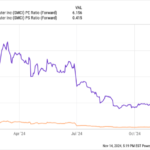Apple (NASDAQ: AAPL) and Alibaba (NYSE: BABA) are both renowned for their stable blue-chip status in the eyes of long-term investors. Apple, famous for its premium smartphone market dominance and sticky software services, has seen a 4% dip in its stock over the past six months. In comparison, Alibaba, China’s e-commerce giant with a significant presence in the cloud and streaming video platforms, experienced a 9% stock decline. This drastic underperformance calls for a closer look into the factors influencing these stalwart companies and whether their stocks present a compelling buying opportunity. Let’s delve into the specifics of each stock’s recent downturn.
Apple’s Recent Setback
Apple’s reliance on the iPhone is increasingly pronounced, representing 52% of its revenue in fiscal 2023. The decline in iPhone sales, coupled with challenging post-pandemic market conditions and currency headwinds, saw its revenue dip 3%. Impressively, the tech giant managed to maintain flat earnings per share through aggressive share repurchases totaling $77.6 billion. However, tepid demand for its iPhones remains a significant concern for the market. Analysts project modest growth rates of 4% and 8% for its revenue and earnings, respectively, in fiscal 2024, versus a forward earnings multiple of 28.
Despite these challenges, Apple boasts a substantial cash reserve of over $162 billion and a rapidly expanding ecosystem with more than a billion paid subscriptions across its services. The upcoming launch of the Vision Pro headset signifies a potential foray into the burgeoning augmented and virtual reality markets, diversifying its hardware business and providing a growth avenue. While these prospects are encouraging, the lack of immediate catalysts and inflated valuations may continue to weigh down the stock, albeit Warren Buffet’s significant stake in the company underscores its long-term potential.
Alibaba’s Struggles
Alibaba faced a substantial setback following China’s antitrust regulators imposing a record fine of $2.8 billion in September 2021, along with stringent operational restrictions. The resulting erosion of its competitive edge against formidable e-commerce rivals, coupled with a cooling Chinese economy and macroeconomic headwinds exacerbated by COVID-19 lockdowns, led to a mere 2% revenue increase in fiscal 2023. Similarly, its cloud business witnessed sluggish growth as companies curtailed software spending, further complicating its growth trajectory.
While analysts foresee a turnaround with projected growth rates of 11% and 22% for revenue and adjusted earnings, respectively, in fiscal 2024, the departure of its CEO, organizational restructuring, and intense competition pose formidable challenges. Nevertheless, Alibaba’s aggressive share repurchases totaling $15.7 billion and a low forward P/E multiple of 8 might provide a floor under its stock, albeit with a cloud of uncertainty hovering over its future valuation.
The Preferred Investment: Apple or Alibaba?
Alibaba’s relatively low valuation may appear enticing, but the persisting uncertainties surrounding its growth and the prevailing threat of delisting for U.S.-listed Chinese stocks warrant caution. Furthermore, tightening regulations for AI chip sales to China could pose additional hurdles to its cloud infrastructure expansion. In contrast, Apple’s stable growth, robust ecosystem, and substantial cash reserves position it favorably against Alibaba’s macroeconomic, competitive, and regulatory challenges. Ultimately, Apple emerges as the more promising investment option in the current landscape, despite its temporary lack of favor with the market.
Before making a decision on investing in Apple stock, it’s imperative to consider the comprehensive analysis provided by the Motley Fool advisor team. They have identified ten stocks that they believe could yield substantial returns in the coming years. This insight, coupled with historical data demonstrating the Stock Advisor service’s outperformance, warrants diligent consideration before making investment decisions.





